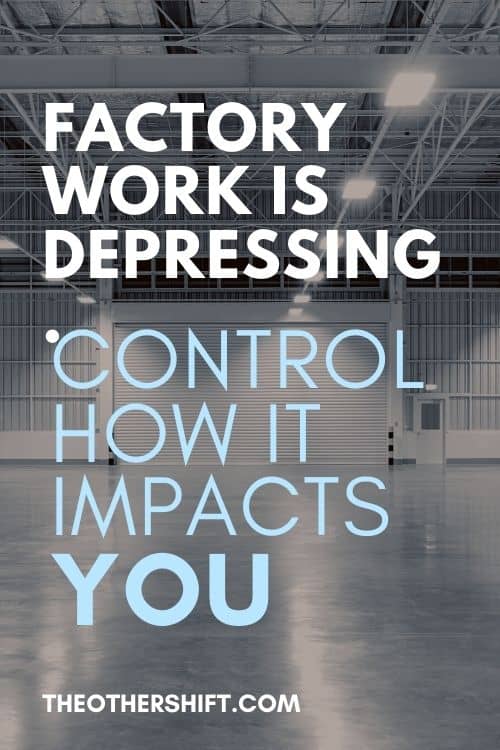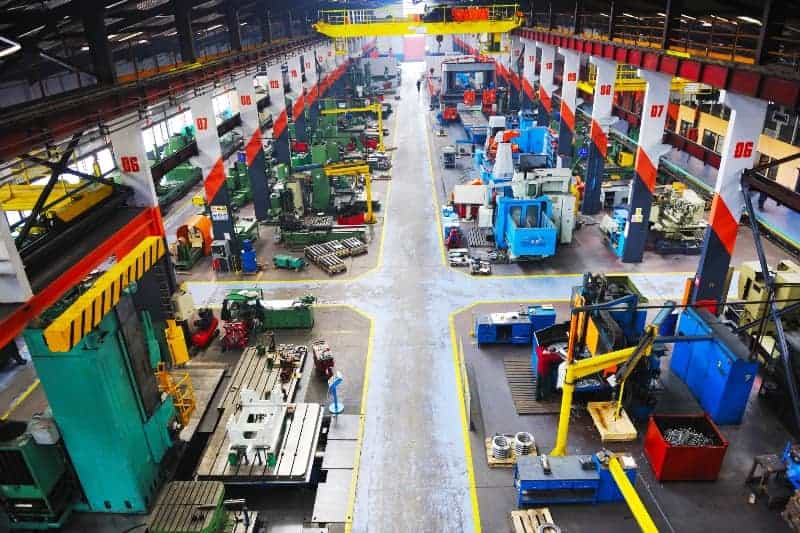Disclosure: This page may contain affiliate links, meaning we receive a commission if you decide to make a purchase through our links, but this is at no additional cost to you. Please read our disclosure and privacy statement for more info.
Depression is one of the biggest problems facing the world today, yet rarely discussed in the context of factory workers. These workers assemble our day-to-day goods, and the majority are international or domestic migrants working under what can sometimes be suboptimal conditions. So if you’re a current worker looking for some guidance, or contemplating doing this line of work, let’s have a conversation on what you must know.
Factory workers feeling depressed or burnt out should see a medical professional first and foremost. When on the job, surround yourself with positive co-workers, provide for others without expectation and focus on the perks of the job. If still depressed after exhausting all options, consider an alternative role.

Factory workers have long hours in a limited space, complete repetitive work whilst often managing the pressures of living in a foreign country. Although reports of suicide have primarily ceased in the data we’ve found, the case is different for depression, as the crisis is on the rise for factory workers. We find this news extremely concerning and if the information in this article even helps one person see life and work in a more positive manner, we think that’s a great start to reversing that trend!
Contemplating Factory Work? Here’s What’s Involved
As a brief introduction, factory work defines economic change because it is central to the existence of industrialization. The system is a method of manufacturing goods and organizing work differently from small-scale workshops.
If you’re contemplating factory work, understanding the responsibilities and duties involved will determine your success level.
- A factory worker is responsible for using suitable equipment and machinery to produce products for public consumption. Factory work teaches discipline with a sense of accomplishment. (source)
- The job involves packaging and categorizing products like toys, food, and household goods, processing the merchandise based on specification and demanded quantity.
- Factory workers also monitor the supply catalogs, ensuring items are without flaws before circulation and maintaining a clean production area. Having the skill to manufacture quality products with a time frame is essential for every factory worker. (source)
- A factory usually contains chemicals, heavy machines, and sharp tools for production. (source)
- These workers use squares or dividers to mark material dimensions and maintain communication with supervisors to resolve problems.
- Working in a factory can negatively affect employees psychologically and place physical stress on the body because of the long working hours and often poor conditions.
- Accidents can happen while moving machinery parts or heavy objects leading to foot, wrists, leg, or shoulder problems – especially when you’re tired due to lack of sleep. (Here are some tips on how to get more)
The percentage of factory workers working with a college degree is low in the United States, so there is a chance of success for high school degree holders.
The average salary for workers annually is $32,405, averaging about $16.01 an hour. Factory workers generally earn a yearly salary ranging anywhere from $16,000 to $27,000. (source)
Related: Work from Home Night Shift Jobs: A Must Read Before Applying

Is Factory Work Bad For Your Health?
Factory work can be bad for your health due to harsh environmental factors such as poor ventilation, exposure to chemicals and specialized equipment, repetitive physically demanding tasks, and also social dangers such as unfair working conditions in and out of the factory.
But there are also good parts about working in a factory such as contributing to the growth of the economy and working within an effective and supportive team. There is enormous support for global and national economies with innovative rewards for individuals and families from the factory industry.
Check out the table below as we take a closer look at the positives and dangers of factory work.
| Positives of Working in a Factory | Dangers of Working in a Factory |
|---|---|
| Potentially Higher Hourly Pay Getting a higher hourly pay is a common perk for factory workers who are loyal, hard-working and dedicated to one organization unlike retail or restaurant employees. For instance, workers earn an average of $10 to $13 per hour with a possibility of making up to $20 per hour in some cases. (source) | Environmental Conditions There are many health dangers for employees working in a factory such as; poor ventilation, loud noises, the potential for factory fires and frequent chemical exposures. (source) These conditions can be made worse without proper safety equipment such as; earplugs, safety glasses and face masks. |
| Growth Possibilities Alternating career fields such as engineering and janitors are open to factory workers, which means there is a growth opportunity for everyone. For instance, you can start a factory working career in distribution, fabrication, welding, and lots more. The introduction of technology and automation continues to affect the manual labor component of the industry, with more opportunities for workers in new roles and the need for repetitive tasks in some factories is almost non-existent nowadays (in some factories). | Potential Health Concerns Repetitive movements can cause musculoskeletal health issues that result in more sick days. These injuries may result in the inability to complete the task at hand, causing great financial strain. (source) Related: Shift Work & Mental Health – What People Don’t Tell You |
| High demand Factories need people with valuable skills to execute functions for improved productivity. A shortage of skilled workers means there are lots of open jobs. If you possess skills for a particular job, the demand is high, and there is a high chance of landing the job. Experience, knowledge, and expertise are not always requirements for factory work, so supervisors are willing to groom the right candidate. (source) | Social Dangers Social dangers include unfair social conditions in and out of the factory. This includes; low wages leading to working multiple jobs, repetitively long work hours including night shift, maltreatment from supervisors, team leaders or other workers. There may also be ethnic or gender discrimination. Employees spending excessive hours working are more likely to be unhappy with their job and display depressing signs. See – Night Shift and Depression. Are They Linked? |
| Learn Discipline and Respect Working in a factory helps you understand that everything must work in harmony, from the tools to workers to achieve a common goal. You learn to respect all types of works because they make our jobs and lives easier. The factory teaches you discipline and how to work with others and associate hard work with livelihood. | Chronic Health Implications Factory working can damage the body due to, non-traditional hours that work against our body clock causing a significant lack of sleep on a regular basis and limited flexibility in regards to breaks whilst on shift. Want to learn more? Take a look at; Does Night Shift Shorten Your Life? 10 Impacts of 3rd Shift |

How Can Factory Workers Gain A Positive Mindset About Work?
Having a positive mindset can be challenging for factory workers, especially if you don’t feel supported or the situation you’re working in is unsafe.
The situation can snowball even more though if you continually focus on the negative aspects of the job and surround yourself with people constantly reminding you about the parts you don’t like so much.
This may seem fluffy but entertain me for a second, workers can develop a positive attitude by viewing obstacles as opportunities.
Here are a few ways you can flip things around.
Find Positive Co-workers and Mentors
Surrounding yourself with positive people will help you eradicate negativity and boost your confidence with positive affirmations. The positive words from co-workers or mentors will affect your line of thinking and contribution to the job. (source)
It may feel odd in the beginning to hang around with different people, but the next time you’re having lunch sit with somebody else and see how you feel.
Helping Colleagues
Another way to gain a positive mindset about your job as a factory worker is to help your colleagues without expectations. You assisting other colleagues will affect your mindset positively, making you more fulfilled and feeling healthier.
You determine the mindset that you bring to work each day, so having a helping mindset will not only make you more popular amongst your peers, but it may also transition your headspace outside of work for the better too!
Stop Complaining
Is there an upcoming job-related project giving you a difficult time? It is time to stop complaining and view hurdles as a way for improved performance.
Factory workers undergo high levels of stress, and letting out a little frustration is normal. But all people experience those feelings and it’s those that can control those frustrations who win out in the long run.
Our advice – do not vent about your job at your workplace, as there is nothing to gain from doing this on your front, nor does it help with your colleagues mindset on the job either.
Save this conversation for a trusted friend or your spouse/partner outside of the four walls of the factory.
“There is something to be said for going to work, doing your job and coming home”
Fellow factory worker
Empathy
Empathy in this context means developing a concept to understand worker’s perception of their environment. Workers manage pressures from demanding supervisors, and many yell at employees at will.
You can encourage empathy development in factories with the below steps:
- Assess communication: The way supervisors communicate with workers plays an integral role in their relationship. If a supervisor yells or uses rude language, it may demoralize workers and discourage them from asking critical questions to improve productivity. If you see this happening to you, we encourage you to have a conversation about it with the right person.
- Create an improvement plan: A simple intervention with an improvement plan will go a long way in easing the pressure. Management should work with you on the agenda and discuss areas that require improvement. (source)
Health and Nutrition
Corporate organizations understand the impact of health and nutrition on productivity. Job stress has a significant effect on mental health for factory workers as many suffer various issues like depression, anxiety, and sleep disturbances.
Workers can also get burned out with problems to their wrist, back, knees, shoulders, or feet.
Nutrition in factory workers improves health, contributes to a positive environment, minimizes depressing thoughts, and improves the company’s bottom line – which may not be a big thing to you right now, but those companies who are making money directly from you work, will typically reward you too with some extra $$$’s.
Here are a few food and nutrition based articles we wrote which are worth a read;
- Shift Work Nutrition Advice Most Are Afraid to Talk About
- Night Shift and Caffeine. How To Use It Wisely
- Healthy Meals for Shift Workers (with Recipes and Videos)
- Night Shift Food Cravings. How to Tame Them
Factory workers with a positive mindset about their jobs are more likely to embrace skill advancement to improve productivity and the situation for themselves.

Exercise and Mindfulness
There is a marathon work session for factory workers as many perform a specialized task for at least nine hours per day, sometimes up to six or seven days a week. This work level can desensitize workers’ minds and bodies because of the repetitiveness, which could involve assembling more than 500 phones or sewing a jacket sleeve 700 times per day. (source)
The corporate world optimizes workers’ performance and creativity by encouraging them to move every 30 minutes, so why is the case different with factory workers?
Every worker needs to exercise and stretch their body to energize their mindset for quality performance on the job. (source)
Make this a priority for you when on the job and if you don’t get this oppertunity, raise it with your manager. You could also ask for a regular rotation between workers, depending on your department and if added work is available, as this is another method to exercise the body and improve productivity in the factory.
If you want some further insight into exercise as a shift worker, this resource will be helpful. If you’re a night shift worker and wondering when you squeeze in a workout, check this post out.
[VIDEO] – If you work multiple nights in a row, this video will provide you with a few tips. (We invite you to follow us on YouTube too!)
In Summary: Factory Work is Depressing. Control How It Impacts You
Factory workers deal with pressures and conditions the average office worker would not. If you find your external environment is impacting your internal environment negatively, and your options are limited in finding a new job, then focus on yourself and how you can change your own mindset regarding your approach to work.
If we didn’t need to work, I very much doubt anyone would. But it’s a necessary evil to live the life we so desire.
If you do have the ability to be choosy regarding your job, then be sure to ask questions about the working conditions as part of the interview process. Even better, ask for a tour of the facility so you can see things for yourself!
We hope this article has provided you a totally different approach!
Cheers,

Disclosure: This page may contain affiliate links, meaning we receive a commission if you decide to make a purchase through our links, but this is at no additional cost to you. Please read our disclosure and privacy statement for more info.
- www.encyclopedia.com/international/encyclopedias-almanacs-transcripts-and-maps/factory-work
- www.workforce.com/news/are-your-factory-workers-know-it-alls
- https://en.hesperian.org/hhg/Workers’_Guide_to_Health_and_Safety:How_factory_work_can_harm_your_health
- https://www.fairlabor.org/blog/entry/examining-impact-long-hours-factory-workers
- https://www.brainia.com/essays/Effects-Of-Building-a-Factory-In/7214.html
- https://thewire.in/labour/factory-workers-12-hour-shifts
- https://www.huffpost.com/entry/average-cost-factory-worker_n_1327413
Recent Posts
An examination of the night shift professions, that while sometimes underappreciated, are necessary for civilization, in its current form, to exist. A city can be thought of as a machine. Each...
Culminated from an exhaustive yet well-funded journey into the night, this article will prepare you for life outside of work while being a denizen of the dark. During days off, night shift...

